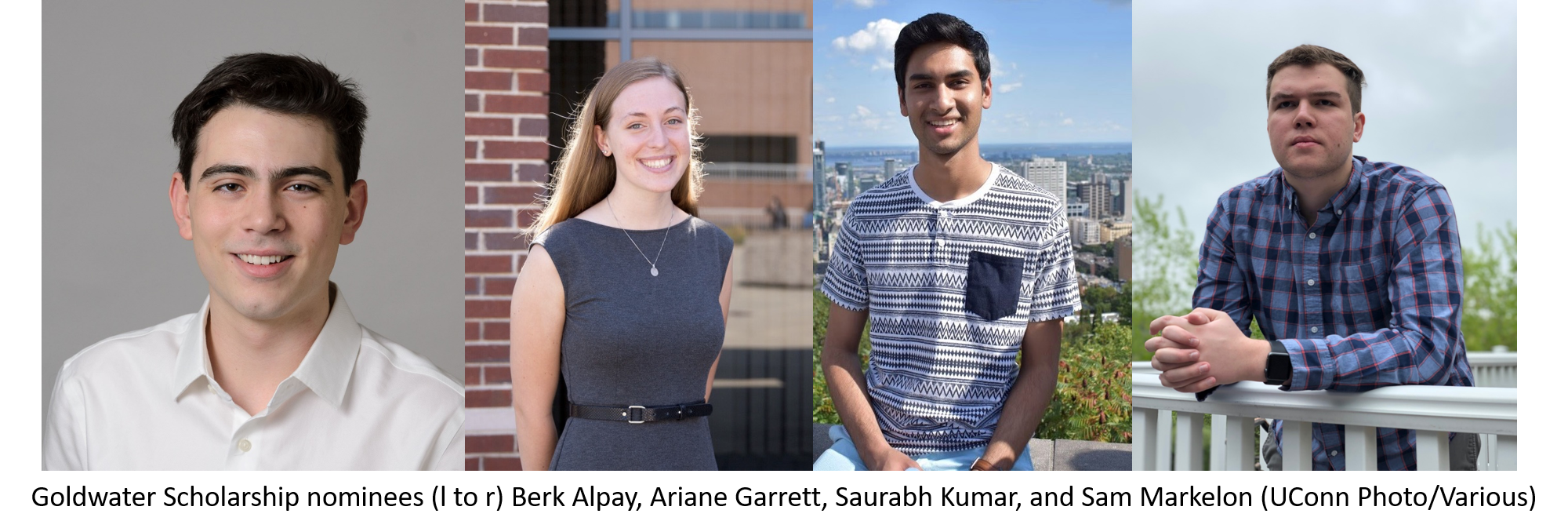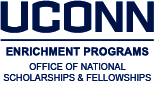Berk Alpay (ENG ‘21, CLAS ‘21) from Storrs, CT, is a STEM Scholar majoring in computer science and mathematics, and minoring in statistics. He plans to pursue a Ph.D. and a research career in computer science after graduation. Berk has been interested in artificial intelligence and neural networks since high school, and found an opportunity to apply them in Dr. Emmanouil Anagnostou’s Outage Prediction Model group in the Eversource Energy Center at the beginning of his first year at UConn. His focus has been in developing machine learning techniques to accurately predict power outages in Connecticut caused by storms that are growing in severity under climate change. His first major project was to develop a two-step logistic regression classifier and random forest regressor model that predicts whether an outage is to occur and, if so, to predict how many. Named a Holster Scholar in 2018, as his summer research project Berk formulated a novel modeling framework for forecasting outages from thunderstorms, whose dynamic character has proved a particular challenge for existing models. He has since developed a long short-term memory neural network that takes advantage of this new framework as well as recent advances in NOAA’s weather feature forecasting to predict outages at an hourly, rather than stormwide, temporal resolution. He is now working to finalize the model for publication. Moving forward, he is eager to explore applications of genetic algorithms to his research in meteorological impact forecasting and beyond. Berk received the Dominick A. Pagano Endowed Scholarship in Computer Science & Engineering in 2018. Outside of his research, Berk is an avid reader, amateur guitarist, and science contributor to UConn’s Daily Campus.
Ariane Garrett (ENGR,’20, CLAS, ’21) is an honors student and STEM Scholar from Pleasant Valley, NY. She is pursuing a dual degree in Biomedical Engineering and Spanish, with plans to achieve a Ph.D. in Biomedical Engineering after graduation. She has been working in the Hoshino Laboratory since the spring of her freshman year on implantable medical devices, specifically a novel cerebral spinal fluid shunt capable of measuring flow in vivo. She has focused on the development of an implantable optical read out system and a polydimethylsiloxane (PDMS) flow sensor capable of measuring the required flow rates for cerebral spinal fluid. The summer after her freshman year she was named a Holster Scholar and received an IDEA grant for her research. Her work on the implantable optical read out system was patented in Spring 2018, and the following summer she received a SURF award to support her research. Currently, Ariane is leading the device testing and working towards fully integrating the device parts into an implantable capsule. Outside of the lab, Ariane is passionate about expanding access to technology and has worked towards this goal as Vice President of Engineers Without Borders. She is also a Peer Research Ambassador and a tutor in the Engineering Tutoring Center. When she is not busy with school or work, she enjoys hiking, baking, and spending time with friends.
Saurabh Kumar (CLAS ’20) from North Andover, MA, is a STEM Scholar majoring in Physiology & Neurobiology and minoring in Statistics. He is planning on pursuing an M.D./Ph.D. degree in Neurobiology to investigate effective therapies for patients with central nervous system damage following injury and lesioning. His research career began the summer of 2015 in the Cao Lab at the University Of New England College Of Osteopathic Medicine where he investigated glial cell inflammatory responses to chronic morphine use in a rodent AIDS infection model. This work was published in the Journal of Neuroimmunology. In the Conover Lab at UConn, Saurabh has conducted research characterizing the normal development of the brain’s lateral ventricles and the associated ventricular-subventricular zone (V-SVZ) stem cell niche, which was recently published in the journal: Development. Using this normal control model, Saurabh is currently charactering development of the stem cell niche in fetal-onset hydrocephalus using archival tissue samples and MRI scans in addition to an induced-mutation hydrocephalic mouse model for his University Scholar project which was supported by a SURF grant in 2018. Outside of the laboratory, Saurabh is an avid clarinetist serving as a 1st/Principal Clarinet player in both the UConn Symphonic Band and UConn Chamber Ensemble Club. He is also the Co-President of the UConn KDSAP chapter – a student-run organization that organizes and provides free kidney health screenings to medically under-served populations. Saurabh further enjoys STEM education for children, serving as a mathematics tutor for K-12 students in virtual online classroom and in-person settings.
Sam Markelon (ENGR ‘20) from Burlington, CT, is a STEM Scholar pursing a B.S. in computer science and a mathematics minor. He plans on earning his Ph.D. in computer science focusing in cryptography and information security after graduating from UConn. Sam began his time at UConn as a physics major. In his freshman and sophomore year he was heavily involved in nuclear research. During the summer of 2017 he was in Newport News, VA at Jefferson National Laboratory working on simulation software. The following summer he was at L’Institut de physique nucléaire d’Orsay in France working on data analytic tools for accelerator experiments. Since then he has transitioned to being fully invested in computer science. In the Fall of 2017 he began working with Dr. Walter Krawec in the Computer Science and Engineering Department doing novel research involving the analysis of quantum key distribution protocols with evolutionary algorithms. Sam coauthored a paper with Dr. Krawec for the 2018 ACM GECCO conference, and together they are working on a new paper. In the fall of 2018 Sam received an IDEA grant to work on analysis of post-quantum cryptosystems specifically the lattice-based NTRUEncrypt. He recently wrote an implementation of said cryptosystem in Python that is available on GitHub. Sam’s general research interests are post-quantum cryptography, blockchain protocols, and cryptographic primitives. Aside from research Sam served as an undergraduate teaching assistant the past semester for CSE 2050: Data Structures and Object-Oriented Design. He is also heavily involved with the ACM student chapter, leading the cryptography subgroup. In addition to academic hobbies Sam enjoys athletics, playing intramural sports year round.
To learn more about these and other nationally-competitive scholarship and fellowship opportunities, visit the Office of National Scholarships & Fellowships and click “Talk to an Advisor.”

